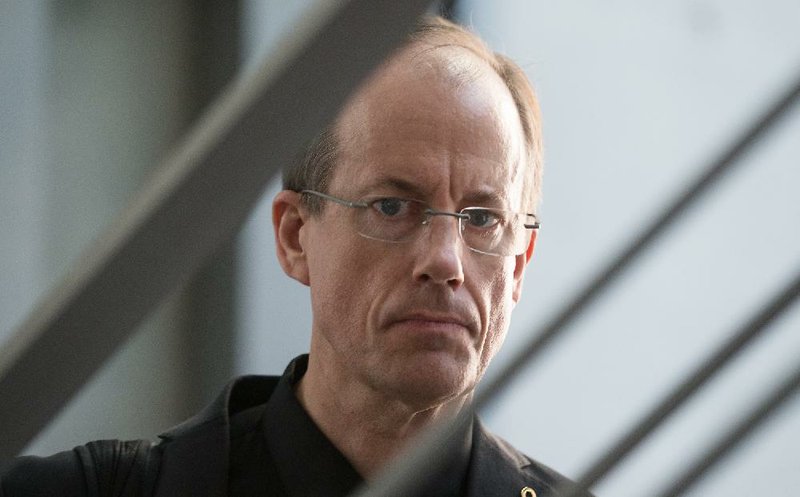BERLIN -- Germany summoned the U.S. ambassador in Berlin on Friday after the arrest of a man reported to have spied for the United States, heightening friction between the two countries over purported U.S. eavesdropping in Germany.
U.S. Ambassador John Emerson was called in "in connection with an investigation by the federal prosecutor," the German Foreign Ministry said in a statement. The U.S. envoy "was asked to help in the swift clarification" of the case, it added.
Federal prosecutors said a 31-year-old German man was arrested Wednesday on suspicion of spying for foreign intelligence services. They did not identify the suspect or the intelligence services.
German government spokesman Steffen Seibert said Chancellor Angela Merkel had been informed of the arrest.
Seibert said the chancellor spoke to President Barack Obama by phone late Thursday, but would not say whether the spying case came up during the call. A brief White House statement about the conversation made no mention of the matter, and White House spokesman Caitlin Hayden declined to comment on it.
Seibert would not comment on reports by Der Spiegel magazine and the newspaper Sueddeutsche Zeitung that the man worked for Germany's foreign intelligence service, known by its German initials BND. The paper said the man was at first suspected of spying for Russia, which German intelligence officials say has markedly stepped up recruitment of German informants.
The newspaper and the magazine, which didn't identify their sources, said the man was suspected of passing on information about a German parliamentary committee investigating the activities of U.S. and other intelligence agencies in Germany. He claimed to have worked with U.S. intelligence since 2012, they reported.
The man met U.S. agents at least three times in Austria and gave them hundreds of secret documents for which he was paid $34,000, Bild newspaper reported, citing security officials it didn't identify. The documents were seized on a thumb drive containing 218 stolen files and a laptop at the suspect's home, Bild said.
Seibert said members of the parliamentary panel had been informed of the arrest.
"I expect this issue to be thoroughly clarified," said Thomas Oppermann, the parliamentary caucus leader of the Social Democrats. If allegations that the U.S. sought information on the probe prove true, "this would be an unheard-of attack on the freedom of our parliament."
The U.S. National Security Council declined to comment Friday, and the German intelligence service didn't immediately return a call seeking comment.
Reports that the U.S. National Security Agency spied on German citizens, including on Merkel's cellphone, have caused friction between Berlin and Washington since the allegations were first published last year, based on documents leaked by former NSA contractor Edward Snowden.
Since then, the German government has been under pressure to secure a new agreement with the United States that would curb or at least regulate U.S. intelligence activity in Germany, where the history of Nazi and Communist regimes makes people particularly sensitive about any state snooping on citizens.
Martina Renner, a member of the Left Party on the parliamentary panel, said the case indicated that anyone who examined Snowden's revelations in detail was subject to scrutiny by U.S. intelligence agencies.
"If the media reports are confirmed, then there can't just be a legal response, there also has to be a political response," she said.
Her panel heard testimony Thursday from two former National Security Agency employees, Thomas Drake and William Binney.
Drake claimed that cooperation between the U.S. and German spy agencies greatly increased after the Sept. 11, 2001, terrorist attacks in the United States. He described the German spy agency as an "appendage" of the NSA.
That testimony came hours after a 27-year-old student in Bavaria was identified by name as one of the spy agency's surveillance targets, the first German other than Merkel to be named in that way.
The testimony Thursday lasted late into the evening, delayed in part by an extraordinary meeting between the inquiry panel and the control commission that oversees Germany's intelligence services. The lawmakers were apparently informed of the arrest of the accused spy at that meeting; attendees at such sessions are sworn to secrecy.
Part of the hearing was conducted in closed session after Binney said he would be discussing important secret information with the panel.
There was no immediate confirmation from the German government or the prosecutor's office concerning the reports that the arrested man had been spying for the United States. A statement from the general prosecutor said the man was detained Wednesday by officers from the federal criminal office, the most senior police authority in Germany.
On Thursday, the suspect appeared before a federal court in Karlsruhe, where the federal prosecutor's office is, and was ordered held "on urgent suspicion" of unauthorized intelligence activities, the prosecutor's office said in a statement.
Hans-Christian Strobele, a member of Parliament from the Green Party who sits on both the intelligence oversight body and the NSA inquiry panel, said he had "no reason to deny" the published reports he had seen Friday about the spy case. But he and the head of the inquiry panel, Patrick Sensburg of the Christian Democratic party, each counseled caution.
Sensburg said by telephone that "some reports are simply false." And Strobele, a veteran lawmaker who traveled to Moscow last fall to meet with Snowden, said Friday, "We must have patience and see whether information stands up to scrutiny."
"It would be good to have a very quick reaction from across the Atlantic," he added, though he noted that on the Fourth of July, Americans "have every reason to do something else."
Information for this article was contributed by Frank Jordans, Geir Moulson and Darlene Superville of The Associated Press; by Alison Smale of The New York Times; and by Patrick Donahue, Karin Matussek and Margaret Talev of Bloomberg News.
A Section on 07/05/2014

